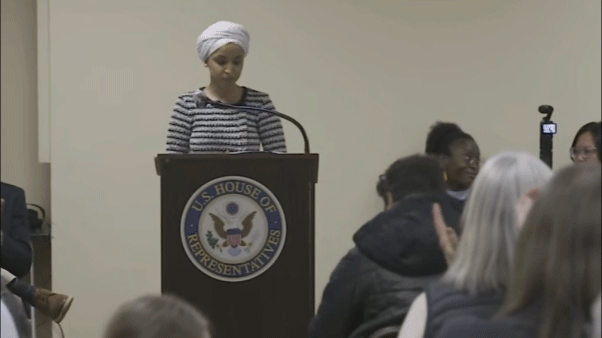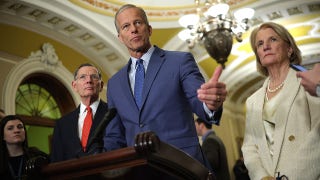Jim Jordan on FISA reform: Constitutional rights of American citizens at stake
Congressman Jim Jordan discusses the push for FISA reform and what's at stake for American citizens
The Big Idea is a series that asks top lawmakers and officials to discuss their moonshot — what’s the one proposal, if politics and polls and even price tag were not an issue, they’d implement to change the country for the better?
Rep. Jim Jordan, R-Ohio, says reforming the Foreign Intelligence Surveillance Act (FISA) is paramount to protecting U.S. citizens’ right to privacy, warning that if a president of the United States can fall victim to misconduct, so can the average American.
Jordan, the top Republican on the House Judiciary Committee, has been a leading voice for FISA reform for months. Jordan helped author the USA Freedom Reauthorization Act of 2020, which passed the House of Representatives this spring and moved to the Senate.
HOUSE PASSES BIPARTISAN FISA REFORM, SENDS BILL TO SENATE
The bill, last month, then returned to the House, with lawmakers poised to consider an amendment and pass the package with bipartisan support. The legislation at first was supported by GOP lawmakers including Jordan as well as House Speaker Nancy Pelosi, D-Calif., and Attorney General Bill Barr.
But then President Trump weighed in, urging opposition “until such time as our Country is able to determine how and why the greatest political, criminal, and subversive scandal in USA history took place!” With Trump calling essentially for further examination of the Russia probe, the bill was tabled and lawmakers moved the effort to conference committee, which is meant to resolve differences and strike a FISA deal that can pass both chambers.
TRUMP URGES GOP TO VOTE 'NO' ON FISA BILL, CITING RUSSIA PROBE CONCERNS
FISA reform became a priority for both Republicans and Democrats following a review from Justice Department Inspector General Michael Horowitz, who revealed significant inaccuracies and omissions by the FBI in a FISA warrant application to surveil former Trump campaign adviser Carter Page in 2016.
MCCABE REVEALS CRITICAL FLAWS IN FISA SYSTEM
Some examples of reform Jordan has proposed include the appointment of an adviser to represent all U.S. persons targeted by FISA if they are a federal office holder, a political candidate, a campaign employee or volunteer, or part of a media organization — unless there is probable cause showing they have engaged in espionage, terrorism, or proliferated weapons of mass destruction.
FISA COURT BLOCKS FBI AGENTS LINKED TO CARTER PAGE PROBE FROM SEEKING WIRETAPS, OTHER SURVEILLANCE
Jordan also proposed that the attorney general have final sign off on all FISA applications targeting a federal official or political candidate, or someone on a candidate’s staff.
Jordan has also suggested that the president, with advice and consent of the Senate, be the one to appoint judges to the Foreign Intelligence Surveillance Court (FISC), instead of unilateral appointment by the chief justice of the Supreme Court.
ROSENSTEIN TESTIFIES HE WOULD NOT HAVE SIGNED FISA WARRANT FOR TRUMP AIDE IF HE KNEW OF PROBLEMS
Many of Jordan’s proposals will be considered during conference committee meetings in the coming weeks, his office said. The Ohio lawmaker discussed his plans with Fox News:
What is your big idea?
FISA reform. That’s at the heart of what happened. Trying to make sure that the American people understand exactly what happened, and how it was carried into the Mueller probe.
In a letter [Former White House Counsel] Emmet Flood wrote to the attorney general a year ago, or more now, when the Mueller report was just coming out, he said “we would all do well to remember if it can happen to a president of the United States, imagine what they can do to you and I.”
And so for me, that’s always been the focus. They did this to a president, they did it to a three-star general in General Flynn…And what does that mean for you? For members of Congress? And most importantly, for the folks I get to represent?
What are some of the reforms you are proposing?
We had a number of basic reforms at the process level with the FBI and with the Justice Department, having more eyes look at the applications before it goes to the FISA court so that there is less potential for what they did with the Carter Page FISA happening again.
We will have the attorney general … when it involves someone in a political context, will have to actually review it and sign off on it.
Those are just some safeguards that are in the nuts and bolts of the process there.
Tell me why FISA reform is so important to you?
Two reasons. One, what happened to Carter Page, but, just as important, and frankly, maybe more important are the reports that Mr. Horowitz has done—one on Carter Page’s FISA—where he looked at that and came back and said there were many errors and omissions and outright falsifying of documents … to build the case to go to the FISA court.
And then we have the most telling—this was the memorandum alert that Mr. Horowitz put out at the end of March, and it talks about a separate FISA evaluation he was doing on the whole FISA system. He had looked at 29 cases—randomly selected—and he found major, major mistakes in all 29 cases—particularly with the Woods File, which is the basis of evidence that’s then used to validate information to take to the court—there were problems in all 29 cases’ Woods Files.
DOJ INSPECTOR GENERAL SAYS FBI VIOLATIONS WITH FISA WARRANTS WENT BEYOND RUSSIA PROBE
And in four of the 29, they couldn’t even find a Woods File—that you’re required to have under their own rules.
They had their own set of rules and didn’t follow their own set of rules. And Mr. Horowitz has said this is a system-wide problem.
So that is why we need reform.
What do you say to those who say further FISA reform would take a vital tool out of the hands of the intelligence community?
I point to the U.S. Constitution.
I point to the facts that we got from the 29 cases that Mr. Horowitz looked at, and there were problems with every single one.
The president is concerned because he knows it was used against him and knows the implications this has on all U.S. persons.














































